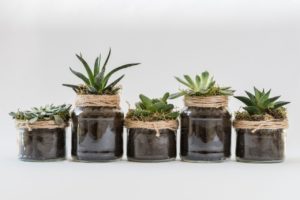Houseplants have a number of brilliant benefits. Keeping plants indoors boosts mood, reduces stress and minimises airborne toxins. If you are working from home or spending a lot more time indoors, it might be time to invest in a few new greens.
Choosing the right plants for your home can be difficult, especially for those who lack gardening experience. We’ve done our research to help you choose the best species for your needs.
Air cleansers
You don’t need an expensive air purifier, many houseplants are known to effectively cleanse the air in your home. Species like the Snake plant, ZZ plants and rubber plants all remove carbon dioxide from your environment and release oxygen, improving the air quality. The Areca Palm is ranked as the best air humidifier by NASA. It improves the humidity in your home and continuously removes chemical toxins like formaldehyde, xylene and toluene. These toxins are emitted from furnishings, detergents, paints etc. and can be harmful to health. Breathing cleaner air improves cardiovascular and lung health, as well as enhancing cognitive ability, which positively impacts on mental health.
Peace lilies are unusual as they produce oxygen overnight as well as throughout the day. This feature makes them perfect to keep in your bedroom as they will oxygenate and cleanse the air around you as you sleep.
Relaxing scents
Houseplants can also impact your mental health as a result of the scent they emit. Plants like lavender, chamomile and peppermint all give off a pleasing aroma that can centre your mind and help relaxation. Lavender is especially beneficial, its calming scent is said to reduce stress, anxiety and even mild pain. Peppermint is known to lower frustration and boost alertness. The menthol within mint plants is also great for relaxing muscles, so peppermint leaves are a good addition to your bath. Both peppermint and chamomile can also be brewed to make a refreshing and calming tea.
Herbs like these can easily be grown indoors but for an easy alternative look for dried bunches of lavender which provide the same aromatherapy benefits without the upkeep.

Herbs: Look good, smell great and add wonderful taste
Rewarding yields
Not only do herbs often provide aromatherapy benefits, edible plants also offer a rewarding yield that can be used in the kitchen. These plants promote mental wellbeing by giving you a sense of achievement and a focus for your attention. They also provide healthy, chemical-free and delicious food without the need for large outdoor space. Growing your own food also reduces plastic packaging and food waste, so there are lots of benefits of growing edible plants in your home.
Aesthetically pleasing
Looking at nature is proven to lower frustration, increase creativity and promote a meditative mindset. The colour green alleviates anxiety, depression and nervousness whilst invoking a sense of hope and adventure. Green plants like ferns are a brilliant addition to your home. Colourful flowers can brighten a room as well as your mood. Bright florals can bring vibrance to a space, whilst summoning positive memories of summer, sunshine and the outdoors. If you don’t want to buy a new bunch of flowers each week, investing in an orchid will give you beautiful flowers that can last for weeks or months. Moth orchids are some of the least expensive, most common and longest-blooming available.
Alternatively, faux flowers and plants are just as pleasing on the eye. Buying fake plants can give you the same aesthetic benefits as the real thing, without worrying about constant maintenance. You won’t get the air purifying and aromatherapy benefits of living plants though.
Mindfulness
For those with green fingers, looking after plants can be a form of self care. The enjoyment of maintaining your houseplants can be a welcome break from a hectic lifestyle by offering a calming activity that has modest requirements. To avoid any points of stress, some may prefer to look after plants that are easily maintained. Things like succulents and cacti require less input than other species. These plants love sunlight and may need to be rotated regularly to keep them straight, but they don’t require much water, especially in the colder months. You can gently clean away dust with a damp cloth and offer them some fertiliser in the summer, otherwise they are very sturdy plants to keep.

Cacti: Easy on the eye and easy to maintain
Whatever you choose, to get the most out of your houseplants make sure to do some research. Garden centre staff will be able to offer expert advice on your plants, or check out the Royal Horticultural Society website for care information.
We have previously interviewed Philippa Baldwin from Willow Heart Garden Design about gardening therapy, have a read here.
I WILL BE ETERNALLY GRATEFUL. AMANDA MAKES YOU FEEL LIKE YOU ARE HER ONLY CLIENT AND HOLDS YOUR HAND TO GUIDE YOU THROUGH














